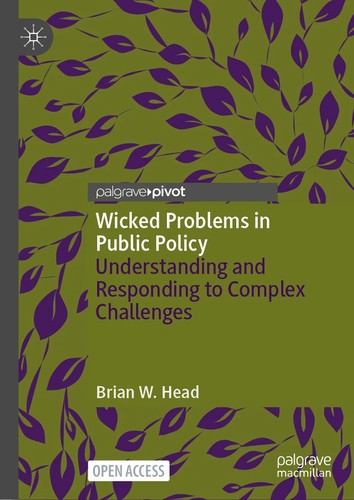Hardcover, 183 pages
English language
Published March 4, 2022 by Palgrave Macmillan.
Understanding and Responding to Complex Challenges Palgrave pivot

Hardcover, 183 pages
English language
Published March 4, 2022 by Palgrave Macmillan.
This book offers the first overview of the ‘wicked problems’ literature, often seen as complex, open-ended, and intractable, with both the nature of the ‘problem’ and the preferred ‘solution’ being strongly contested. It contextualises the debate using a wide range of relevant policy examples, explaining why these issues attract so much attention.
There is an increasing interest in the conceptual and practical aspects of how ‘wicked problems’ are identified, understood and managed by policy practitioners. The standard public management responses to complexity and uncertainty (including traditional regulation and market-based solutions) are insufficient. Leaders often advocate and implement ideological ‘quick fixes’, but integrative and inclusive responses are increasingly being utilised to recognise the multiple interests and complex causes of these problems. This book uses examples from a wide range of social, economic and environmental fields in order to develop new insights about better solutions, and thus gain broad stakeholder acceptance for …
This book offers the first overview of the ‘wicked problems’ literature, often seen as complex, open-ended, and intractable, with both the nature of the ‘problem’ and the preferred ‘solution’ being strongly contested. It contextualises the debate using a wide range of relevant policy examples, explaining why these issues attract so much attention.
There is an increasing interest in the conceptual and practical aspects of how ‘wicked problems’ are identified, understood and managed by policy practitioners. The standard public management responses to complexity and uncertainty (including traditional regulation and market-based solutions) are insufficient. Leaders often advocate and implement ideological ‘quick fixes’, but integrative and inclusive responses are increasingly being utilised to recognise the multiple interests and complex causes of these problems. This book uses examples from a wide range of social, economic and environmental fields in order to develop new insights about better solutions, and thus gain broad stakeholder acceptance for shared strategies for tackling ‘wicked problems’.